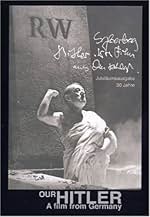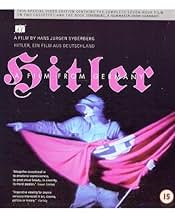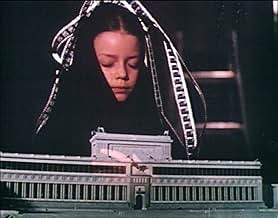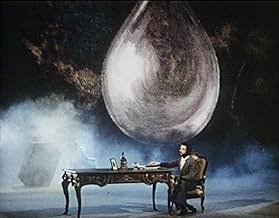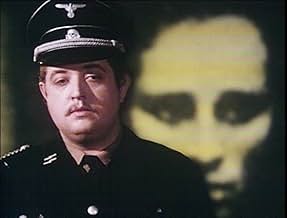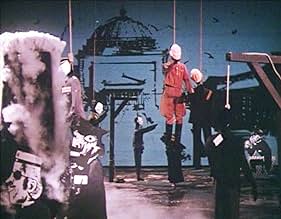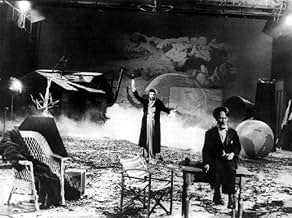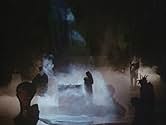Explora el ascenso y caída de la Alemania nazi a través de una vanguardista fusión de marionetas, imágenes proyectadas y partitura wagneriana, meditando sobre la complicidad de la humanidad ... Leer todoExplora el ascenso y caída de la Alemania nazi a través de una vanguardista fusión de marionetas, imágenes proyectadas y partitura wagneriana, meditando sobre la complicidad de la humanidad en los horrores del Holocausto.Explora el ascenso y caída de la Alemania nazi a través de una vanguardista fusión de marionetas, imágenes proyectadas y partitura wagneriana, meditando sobre la complicidad de la humanidad en los horrores del Holocausto.
- Dirección
- Guionista
- Elenco
- Premios
- 2 premios ganados en total
- Dirección
- Guionista
- Todo el elenco y el equipo
- Producción, taquilla y más en IMDbPro
Opiniones destacadas
10batzi8m1
Warning. This is not a movie for an evening of entertainment. Its is 8 hours of surreal images about mass media combining with trivialized pop culture versions of German romantic irrationalizm to create that phenomenon called Hitler, which will never leave the dark corners of human nightmares and the strange world of pop mythology.
I've seen this film twice in a cinema (Berkeley, CA) when it came around. Obviously people willing to subject themselves to eight hours of surrealist images about Hitler as the Great Communicator (the original for you Reagan fans) are going to go in a bit prejudiced. I had not yet seen any other Syberberg films nor read anything about him or his films, as I wanted to experience this for it's own sake without preconceived notions. After intermission, my friend, a warehouse manager, and I couldn't wait to see the rest. The same was true when it returned a few years later and I saw it with an artist friend, who was even more excited. We heard similar buzz from the people around us at intermission. This movie was something special, and after all these years, having re-read the screenplay and amazed at the images, I'd see it again for an all nighter. But I don't really have to because I can replay most of the scenes in my head at any time -- they were that striking and memorable. I guess part of that may have to do with the fact that I am born German, and was once a student of modern German literature, theater, art and lived in Munich when artists like Handke, Thomas Bernhard, Max Frish, Fassbinder, Herzog, Wenders and Syberberg challenged the status quo and awoke Germans to the idea that there is something else besides Brecht, Grass and sighing the Mea Culpa over the Third Reich.
Syberberg had already done films that were hard to get shown (this was before the Video Revolution) and with Hitler he really went overboard. This film could never be a commercial success, but it was worth the making and seeing. It creates images, meant for someone who is steeped in German mythos while at the same time aware of the changes wrought on world media by Edison's invention of the moving pictures. Combine these with mass communication capability, the capability to entrance the masses with the images they want to identify with is the history of both Hitler and Movies. So for eight hours Syberberg bombards the viewer with images of the Black Mary (Edison's studio) as a backdrop, Hitler rising out of Wagners grave in a Roman toga, Radio tranmissions of SS Troopers singing Silent Night direct from Stalingrad, touching personal reminiscances by Hitler's butler of how he liked his underwear pressed, his projectionist eating a sausage picknick at the old Eagle's Nest talking about what a nice regular guy his old boss was.
In short, this movie fills the viewer with indellible images of the capability of mass media to suck in the viewers, give them a sense of intimacy, and trivialize mass murder from a "real life human perspective." No single scene or sermon or 90 minute expose of Auschwitz can ever hope to drive home the real insanity of the mass delusions which created the greatest tragedy of this century. And for Germans the constant cleansing and coping escapism of the post war era (It wasn't us, it was those few bad guys that are now dead) needed a real response by the generation that was born afterwards. And the only way Syberberg could do that was to let all those images of the collective German memory of the great history of its irrationalism and romanticism fight against the attempt to rationalize it's rape by their own philestines.
Memorable quotes include the famous "Every time I hear the word Art I reach for my pistol."
Particularly good are Andre Heller as the melancholy narrator, the dialog between Himmler and his masseur, Christmas stories, and touching human stories about Hitler and his beloved doggies. Those skits are kind of like a news magazine story about the human side of John Wayne Gacey as Bunel and Dali might have filmed it.
I've seen this film twice in a cinema (Berkeley, CA) when it came around. Obviously people willing to subject themselves to eight hours of surrealist images about Hitler as the Great Communicator (the original for you Reagan fans) are going to go in a bit prejudiced. I had not yet seen any other Syberberg films nor read anything about him or his films, as I wanted to experience this for it's own sake without preconceived notions. After intermission, my friend, a warehouse manager, and I couldn't wait to see the rest. The same was true when it returned a few years later and I saw it with an artist friend, who was even more excited. We heard similar buzz from the people around us at intermission. This movie was something special, and after all these years, having re-read the screenplay and amazed at the images, I'd see it again for an all nighter. But I don't really have to because I can replay most of the scenes in my head at any time -- they were that striking and memorable. I guess part of that may have to do with the fact that I am born German, and was once a student of modern German literature, theater, art and lived in Munich when artists like Handke, Thomas Bernhard, Max Frish, Fassbinder, Herzog, Wenders and Syberberg challenged the status quo and awoke Germans to the idea that there is something else besides Brecht, Grass and sighing the Mea Culpa over the Third Reich.
Syberberg had already done films that were hard to get shown (this was before the Video Revolution) and with Hitler he really went overboard. This film could never be a commercial success, but it was worth the making and seeing. It creates images, meant for someone who is steeped in German mythos while at the same time aware of the changes wrought on world media by Edison's invention of the moving pictures. Combine these with mass communication capability, the capability to entrance the masses with the images they want to identify with is the history of both Hitler and Movies. So for eight hours Syberberg bombards the viewer with images of the Black Mary (Edison's studio) as a backdrop, Hitler rising out of Wagners grave in a Roman toga, Radio tranmissions of SS Troopers singing Silent Night direct from Stalingrad, touching personal reminiscances by Hitler's butler of how he liked his underwear pressed, his projectionist eating a sausage picknick at the old Eagle's Nest talking about what a nice regular guy his old boss was.
In short, this movie fills the viewer with indellible images of the capability of mass media to suck in the viewers, give them a sense of intimacy, and trivialize mass murder from a "real life human perspective." No single scene or sermon or 90 minute expose of Auschwitz can ever hope to drive home the real insanity of the mass delusions which created the greatest tragedy of this century. And for Germans the constant cleansing and coping escapism of the post war era (It wasn't us, it was those few bad guys that are now dead) needed a real response by the generation that was born afterwards. And the only way Syberberg could do that was to let all those images of the collective German memory of the great history of its irrationalism and romanticism fight against the attempt to rationalize it's rape by their own philestines.
Memorable quotes include the famous "Every time I hear the word Art I reach for my pistol."
Particularly good are Andre Heller as the melancholy narrator, the dialog between Himmler and his masseur, Christmas stories, and touching human stories about Hitler and his beloved doggies. Those skits are kind of like a news magazine story about the human side of John Wayne Gacey as Bunel and Dali might have filmed it.
Most of this movie consists of people addressing the camera, while surrounded by ugly puppets and other pieces of junk. I'm astounded by the positive reviews. I'm left with only a slightly better knowledge as to why many Germans followed Hitler. This film would have made a much better book, with footnotes, citations of sources, and suggestions for further reading. But perhaps that was impossible. As I believe George Harrison once said, "Avant-garde means haven't got a clue." What is the difference between someone talking to you while he sits next to a candelabra and your reading what he has to say in a book? The same goes for speakers with old war film clips as background. I suppose one could argue that watching this film is a more visceral experience than reading a book on the same subject. However, this argument is undercut if the visceral experience is nausea.
10noorym
I first have to say that I have a real fascination with Hitler. NOT admiration, fascination. This film was given to me by a friend who shared this intrigue. Rininger, upon giving me this film said "you are absolutely going to love this" Truer words will never be uttered. My friend passed away a few days ago, and I will be forever grateful that he introduced me to this (in my opinion)masterpiece of film making. This film is definitely not for everyone. But those who are able to take heavy doses of beauty and provocative discourse this film is a must. I was absolutely riveted the first time I saw it and continue to return to it on a regular basis to take whatever dose time might permit. The sets are to my eye breathtakingly wonderful. Despite the fact that I don't understand more than a word of German is a none issue. I find that I can ignore the subtitles and lose myself in the sheer passion. This film communicates on so many levels that it is impossible to walk away from it empty. It will probably take many many viewings before I can even scratch the surface of this films visual richness and cultural significance. I highly suggest the viewing of this film for any seriously art minded persons. John R. I thank you for alerting me to this delicious slice of experience. Love ya man.
Exhausting and ridiculously long, and almost impossible to explain. It's incredibly unique, for better or worse, and something I'm impressed with but would struggle to rewatch, and also would hesitate to recommend to just about everyone.
It's something like a fusion of documentary and biographical film, all filmed on a stage (so almost like a play, too), with tons of voiceover - both by actors and through real historical speeches - all of it aiming to unpack who Hitler was, what he did, how he rose to power, how he affected the world, and the implications the existence of such an individual has on the psyche of the world's population. The presentation is strange, sometimes repetitive, surreal, dreamlike, minimalist, and often eerie.
As broad as that sounds, it's also only scratching the surface. It's so dense and filled with so many ideas- some clear, most philosophical, and some presented in a very obscure way. It's the kind of movie you feel like you're drowning in sometimes. But I know it's sort of meant to be this way. It has some degree of power this way, but it renders the film all but impossible to fully digest.
But maybe that's okay. Maybe scratching the surface and still gaining a lot is significant. Maybe anyone brave enough to watch it more than once would have it all made clear.
I don't think I'll ever watch it again. But I don't regret watching/being almost suffocated by it once.
It's something like a fusion of documentary and biographical film, all filmed on a stage (so almost like a play, too), with tons of voiceover - both by actors and through real historical speeches - all of it aiming to unpack who Hitler was, what he did, how he rose to power, how he affected the world, and the implications the existence of such an individual has on the psyche of the world's population. The presentation is strange, sometimes repetitive, surreal, dreamlike, minimalist, and often eerie.
As broad as that sounds, it's also only scratching the surface. It's so dense and filled with so many ideas- some clear, most philosophical, and some presented in a very obscure way. It's the kind of movie you feel like you're drowning in sometimes. But I know it's sort of meant to be this way. It has some degree of power this way, but it renders the film all but impossible to fully digest.
But maybe that's okay. Maybe scratching the surface and still gaining a lot is significant. Maybe anyone brave enough to watch it more than once would have it all made clear.
I don't think I'll ever watch it again. But I don't regret watching/being almost suffocated by it once.
I don't know how to begin to "review" this cinematic experience, as I felt immersed in the film rather than trying to get my mind around it entirely. This work is neither an apologia for Hitler and the Third Reich nor a condemnation, but a serious attempt by a true intellectual and film auteur, Syberberg, to look at it ALL from every side, the horror and evil as well as the cultural, historical, and philosophical foundations of Hitler and the German people.
The film is subtitled "A Film From Germany" because it is plumbs not only the depths of Nazism and World War II but the entire German psyche. It attempts to present, through hard facts, historical documents, films and photographs, and also through dream, metaphor, and stunningly haunting tableaux, what Hitler really MEANT and what he continues to mean. There are many excellent actors portraying both well-known figures like Himmler and lesser known individuals like Hitler's valet who relate what might seem like endless minutiae of Hitler's daily life but do add a great deal to the ultimate picture of the man about whom so much has been written. It seems that if you don't revile him completely, even today, you are suspected of being a neo-fascist yourself, but this film attempts to offer a complete picture and by extension, a baring of the German soul and what is referred to on several occasions as their "happy guilt".
One issue I have is with the English subtitles. There are so many typographical and spelling errors that one could only call it sloppy. I don't know why a film of this magnitude that took so long coming to home video shouldn't have had more scrupulous editing. Considering how many talking heads there are in the film and the volume of exposition, it was hard enough to keep up with the subtitles without stumbling over the mistakes. On the plus side, there is a lot of English voice-over that provides some breathing space for us Anglos.
And one last comment on the historical context. Considering the film was made in 1977, 34 years ago, much has changed in the world, in Europe, and in the global culture, that the film presciently hints at, not the least of which is the continued emergence of Germany and Japan both economically and democratically. One important point "Our Hitler" made was that Hitler was probably the apotheosis of democracy, rising as he did from the middle class and glorifying the common people, and being democratically elected by them. What he did with that mandate was probably the most horrifying and endlessly fascinating stories of the 20th century.
The film is subtitled "A Film From Germany" because it is plumbs not only the depths of Nazism and World War II but the entire German psyche. It attempts to present, through hard facts, historical documents, films and photographs, and also through dream, metaphor, and stunningly haunting tableaux, what Hitler really MEANT and what he continues to mean. There are many excellent actors portraying both well-known figures like Himmler and lesser known individuals like Hitler's valet who relate what might seem like endless minutiae of Hitler's daily life but do add a great deal to the ultimate picture of the man about whom so much has been written. It seems that if you don't revile him completely, even today, you are suspected of being a neo-fascist yourself, but this film attempts to offer a complete picture and by extension, a baring of the German soul and what is referred to on several occasions as their "happy guilt".
One issue I have is with the English subtitles. There are so many typographical and spelling errors that one could only call it sloppy. I don't know why a film of this magnitude that took so long coming to home video shouldn't have had more scrupulous editing. Considering how many talking heads there are in the film and the volume of exposition, it was hard enough to keep up with the subtitles without stumbling over the mistakes. On the plus side, there is a lot of English voice-over that provides some breathing space for us Anglos.
And one last comment on the historical context. Considering the film was made in 1977, 34 years ago, much has changed in the world, in Europe, and in the global culture, that the film presciently hints at, not the least of which is the continued emergence of Germany and Japan both economically and democratically. One important point "Our Hitler" made was that Hitler was probably the apotheosis of democracy, rising as he did from the middle class and glorifying the common people, and being democratically elected by them. What he did with that mandate was probably the most horrifying and endlessly fascinating stories of the 20th century.
¿Sabías que…?
- TriviaFinal part of Hans-Jürgen Syberberg's trilogy on German history, also including Ludwig - Requiem für einen jungfräulichen König (1972) and Karl May (1974).
- ConexionesEdited into Gli ultimi giorni dell'umanità (2022)
Selecciones populares
Inicia sesión para calificar y agrega a la lista de videos para obtener recomendaciones personalizadas
- How long is Hitler: A Film from Germany?Con tecnología de Alexa
Detalles
- Fecha de lanzamiento
- Países de origen
- Idiomas
- También se conoce como
- Hitler: A Film from Germany
- Locaciones de filmación
- Productoras
- Ver más créditos de la compañía en IMDbPro
Taquilla
- Presupuesto
- DEM 1,000,000 (estimado)
Contribuir a esta página
Sugiere una edición o agrega el contenido que falta

Principales brechas de datos
What is the English language plot outline for Hitler, ein Film aus Deutschland (1977)?
Responda
